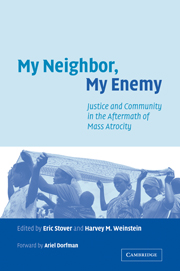Book contents
- Frontmatter
- Contents
- List of contributors
- Foreword by Ariel Dorfman
- Acknowledgments
- Introduction: conflict, justice and reclamation
- Part I Institutional approaches to justice
- Part II Social reconstruction and justice
- 7 Neighbors again? Intercommunity relations after ethnic cleansing
- 8 Memory, identity, and community in Rwanda
- 9 Attitudes toward justice and social reconstruction in Bosnia and Herzegovina and Croatia
- 10 Connecting justice to human experience: attitudes toward accountability and reconciliation in Rwanda
- 11 Public education and social reconstruction in Bosnia and Herzegovina and Croatia
- 12 Confronting the past in Rwandan schools
- Part III Survivors and justice
- Conclusion: a common objective, a universe of alternatives
- Index
10 - Connecting justice to human experience: attitudes toward accountability and reconciliation in Rwanda
Published online by Cambridge University Press: 05 May 2010
- Frontmatter
- Contents
- List of contributors
- Foreword by Ariel Dorfman
- Acknowledgments
- Introduction: conflict, justice and reclamation
- Part I Institutional approaches to justice
- Part II Social reconstruction and justice
- 7 Neighbors again? Intercommunity relations after ethnic cleansing
- 8 Memory, identity, and community in Rwanda
- 9 Attitudes toward justice and social reconstruction in Bosnia and Herzegovina and Croatia
- 10 Connecting justice to human experience: attitudes toward accountability and reconciliation in Rwanda
- 11 Public education and social reconstruction in Bosnia and Herzegovina and Croatia
- 12 Confronting the past in Rwandan schools
- Part III Survivors and justice
- Conclusion: a common objective, a universe of alternatives
- Index
Summary
After the 1994 Rwandan genocide, the government of Rwanda and the international community implemented three judicial responses in an effort to punish those responsible for the violence, help rebuild the country's war-ravaged society, and encourage reconciliation – the International Criminal Tribunal for Rwanda (ICTR), national-level domestic genocide trials, and local-level gacaca courts. The Rwandan government has also established commissions for human rights and for national unity and reconciliation; instituted re-education camps for returned refugees, former prisoners, students, and politicians; established memorials and commemorations to the genocide; and instituted a series of political reforms. While these programs have been adopted in the name of reconciliation and national unity, neither the Rwandan government nor the international community has solicited the views of the Rwandan population regarding the best means of achieving reconciliation and unity.
In implementing policies in a top-down manner, Rwanda is, of course, not alone. Governments and international institutions, such as the United Nations, rarely, if ever, consult affected populations when formulating policies aimed at rebuilding post-war societies. Indeed, while many national leaders and international officials claim to speak on behalf of those most affected by the violence, what people themselves believe is most needed to rebuild and reconcile their war-torn country is usually ignored. In 2002, we set out to gain a clearer idea of how Rwandans understood the concepts of justice and reconciliation and of whether they believed that the judicial initiatives underway in their country would contribute to the process of reconciliation and national unity.
- Type
- Chapter
- Information
- My Neighbor, My EnemyJustice and Community in the Aftermath of Mass Atrocity, pp. 206 - 225Publisher: Cambridge University PressPrint publication year: 2004
- 19
- Cited by



